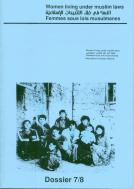Dossier 7-8
Publication Author:
Various
Date:
June 1989 – March 1990
number of pages:
95
ISBN/ISSN:
1018-1342
Languages available:
English 
Following the publication of articles on progressive interpretations of Islam in our previous issues, we chose to highlight efforts by women historians to trace and recover women's history at the advent of Islam. For the first time we have included pieces on Indonesia, the largest Muslim country in the world, where women actively struggle for their rights, and a paper on migrants in the UK where the Rushdie affair was a strong indicator of an extremist religious right.
- Women and the Advent of Islam.
- Islam’s Influence on Indonesian Women.
- Background to the Feminist Movement in Egypt.
- Gender Politics in Iran and Afghanistan.
- Divorce Under Muslim Law.
- Pakistani Women in a Changing Society.
- Muslim Immigrant Women in the UK.
This publication is out of print and is unavailable in electronic format.
Related News
- Mauritania broadens death penalty for blasphemy
- 'We will break every bone': Islamist leaders threaten Bangladeshi lawyer, WLUML Networker
- UN Special Rapporteur in Field of Cultural Rights on the Paris Attacks: “Crime against humanity, crime against culture”
- What ISIS has done to the lives of women
- Afghan clerics uneasy as civil rights movement gains momentum
Related Actions
- Protect Human Rights Activist Sultana Kamal
- Statement in Condemnation of Terrorist Attack Targeting Media Organizations in Afghanistan
- We Strongly Condemn the Terrorist Attacks Taking Place in the Name of “Islam”
- Women Living Under Muslim Laws (WLUML) condemns the harassment of Sri Lankan activist Sharmila Seyyid
- Call for Iraqi Women Victimized by ISIS
Relevant Resources
- Promotion and protection of human rights: human rights questions, including alternative approaches for improving the effective enjoyment of human rights and fundamental freedoms
- Building Civil Societies
- Special Issue: Gender and Fundamentalism
- Position Statement on Apostasy and Blasphemy
- Report of the Special Rapporteur on Freedom of Religion or Belief, Heiner Bielefeldt, Human Rights Council 28th Session
